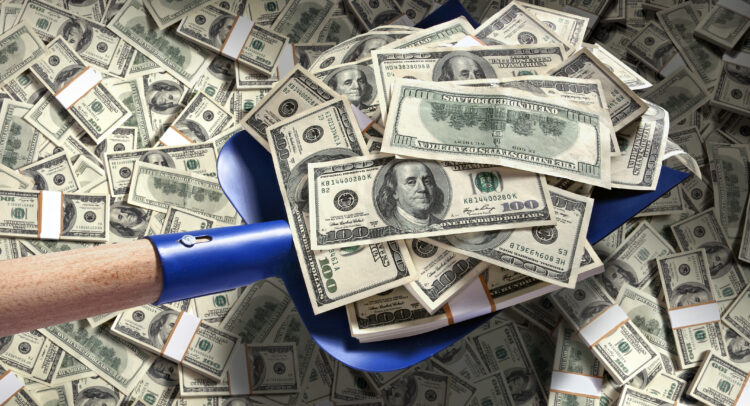The surprisingly strong economic growth in certain sectors of the U.S. economy might have to give credit to the record-high stock market and even interest rate levels. While economic data has recently been a mixed bag, with one day indicating strength and the next indicating weakness, American consumers still remain confident.
Discover the Best Stocks and Maximize Your Portfolio:
- See what stocks are receiving strong buy ratings from top-rated analysts.
- Filter, analyze, and streamline your search for investment opportunities with TipRanks’ Stock Screener.
This confidence provides comfort in continuing to spend freely. Economists would attribute this to an economic phenomenon called the “wealth effect.” The wealth effect contribution is somewhat of a cart-before-the-horse situation where the returns in the investment markets are providing for positive economic activity, rather than a strong economy leading the markets.
Soaring Household Wealth Fuels Spending
Data from the Federal Reserve helps to provide a clear picture of this phenomenon. American household net worth jumped an incredible $5.1 trillion, or 3.3%, in the first quarter of 2024. The surge is largely driven by gains in equities and investment funds, as the upward trajectory of the stock market is reflected in investors’ account balances.
With fatter balances getting even fatter, households feel wealthier and more confident. The wealth effect then comes into play as it translates into increased spending, with consumers comfortable splurging or making larger purchases.
Economic Boost from Interest Rate Income
Higher interest rates offer another reason for American optimism. Those who were previously earning minimal interest, near zero not too long ago, may now be accumulating interest at rates of 5% or higher. Many of these savers would welcome further rate hikes that would flow through to savings accounts or certificates of deposit (CDs). This boost in income is, of course, welcome and further fuels consumer spending.
How much interest? According to the Wall Street Journal, American households earned a staggering $3.7 trillion annually from interest and dividends in the first quarter of 2024. This figure represents a significant increase of $770 billion compared to just four years ago.
A Few Worries Amid Economic Uncertainty
The current economic climate has been sending mixed signals, with some indicators suggesting a potential slowdown while others point towards continued growth. However, the combined effect of a strong stock market and rising interest rates appears to be outweighing these concerns for American consumers. And it’s consumers that are the economic backbone.
The wealth effect from stocks and increased income from interest provide a significant psychological and financial cushion. This gives households the desire to maintain their spending habits despite economic ambiguity.
Future Outlook Tied to Market, Interest Rates
While the current situation seems positive, it’s important to consider the long-term implications. High consumer confidence depends on the trajectory of the stock market and interest rates. A significant market correction or another aggressive rate hike by the Federal Reserve could dampen consumer enthusiasm.
However, for now, American households appear to be riding a wave of financial optimism, fueled by a strong stock market and rising interest rates. This confidence is translating into continued consumer spending, providing a grounding for the overall health of the U.S. economy.
Key Takeaway
The textbook explanation for stock market returns is that the stock market and other financial markets are forward-looking and react to economic expectations and current data trends. However, it appears that growing household wealth and investment incomes can alternatively be drivers of the economy.
The impact this could have on any Fed decision is that there is already significant stimulus in place from consumers without adjusting rates down to a more stimulative level.









